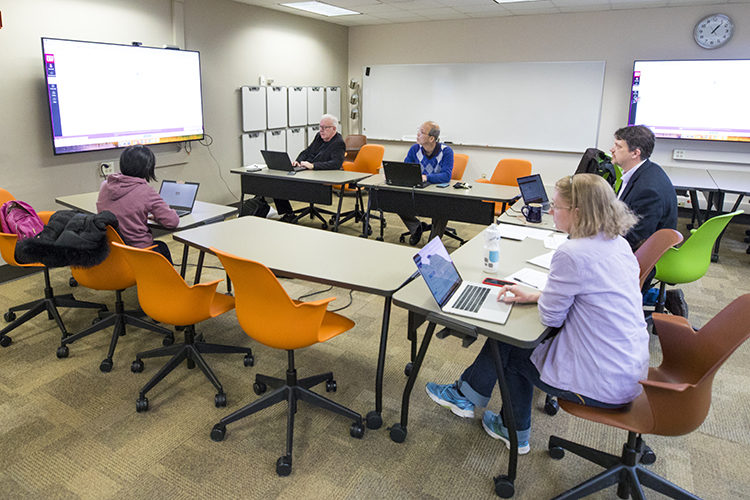More than 11,000 students take at least one online class each semester at UWM, said Dylan Barth, teaching, learning and technology assistant at UWM’s Center for Excellence in Teaching and Learning. For these students, the transition to online classes during the coronavirus pandemic may be relatively easy. But for students who have never taken a course online, the switch can be intimidating.
Online classes don’t have to cause more stress, however. Barth notes they can carry new opportunities for students – and might prove to be a better fit for how they prefer to learn.
With asynchronous online courses – classes where students do not have to gather at the same time for a live lecture – students can do their work when it benefits them. It’s also easier to review content this way, Barth said, as students can go back into lecture videos that are posted online.
For discussion-based courses, Barth said online courses take a more “personalized” approach as students are prompted to interact more with their peers.
“If you’re shy and don’t like to talk in class, you can still contribute your ideas and other students will benefit from those ideas. You’re expressing yourself,” he said.
Taking initiative
But because students don’t have to physically be in class, Barth said, they may have to take more initiative to stay on top of their work.
“So much is about communicating, time, space, avoiding distraction, staying organized – these things are really important for any student but particularly for online,” he said.
That’s where rewards come in, said Simone Conceição, professor in the School of Education and an expert in adult distance learning. If students reward themselves for doing good work, it can reduce the stress of the workload.
“Students need to stay healthy and strong at this time because if they are really stressed out, they are not going to be able to function and focus.”
Conceição and Barth point to several resources to help students in the transition to online learning:
- CETL’s guide for navigating Canvas, including training videos, and online learning tips.
- UWM’s Help Desk to help solve technical difficulties.
- The Writing Center and the Student Success Center, whose tutoring services will move online.
- UWM Libraries’ Ask a Librarian, where students can submit questions any time.
- A guide to student resources in light of COVID-19 from Dean of Students Office.
- A 24/7 crisis text line that can be reached by texting “SHARE” to 741741.
Tips from students
Conceição and Barth agree that one of the best resources for students looking to succeed in online classes is their peers. Because classmates share similar experiences, they are better able to support each other.
UWM students Dana Gaertner, Jojo West and Cortnie Ludwigson have taken numerous online classes, from art history to sociology to communications. They offer advice to students heading into an entirely online semester.
What do you like about online classes?

Gaertner: “A lot of these online classes that are lecture-based save time doing it at home instead of going in and listening to a lecture.”
West: “It actually feels a little easier because we’re not actually in class. We can go back into lectures and really tune into what they’re saying instead of having to rush and type out notes in class because they’re only going to say it once.”
Ludwigson: “I also really like the online class community. When we’re in class, not everyone participates. In online classes, especially ones with discussions, you really have to get to know your classmates well. You interact with them on a daily basis.”
What differences are there in how you learn in-person versus online?
Gaertner: “For online classes, you have to be more aware of when things are due. You have to pay more attention to what is asked.”

West: “I learn better when I don’t have distractions in class. (For online lectures) I can pause, I can really look at the picture, and I’m not hearing students cough and talk to one another in class. I’m not distracted by physically being there.”
Ludwigson: “Online, while there definitely are still ways to stay organized, it takes more effort for me. One way I try to keep organized is I try to block scheduling in my planner because then I can say ‘from this time to this time, I’m going to do my online homework.’ And then I always leave a little coffee break in that block or a Netflix break. That’s my reward for being productive.”
Best piece of advice for online learning?

Gaertner: “What works best for me is doing the online class on the same day every week. The first probably two online classes I did, it was harder to remember what day (assignments were due), but once you’re in the groove of doing it, it’s pretty easy to manage.”
West: “I have a planner, and I write down all the due dates from the syllabus in the planner. I check back twice a week at least.”
Ludwigson: “My biggest piece of advice is to not be afraid of it, to just embrace it. Come into it with a good attitude, being ready to be organized and to set aside time to do it. (Online classes) can be a lot of work, but they are fun, and you learn the same information.”







